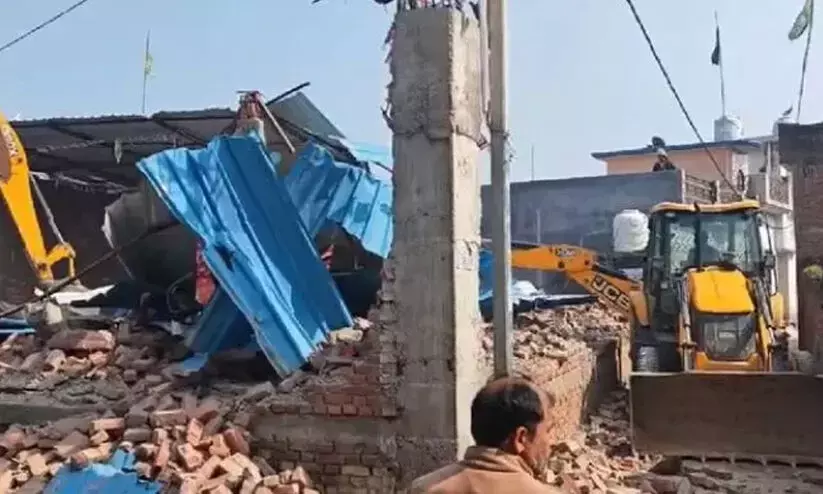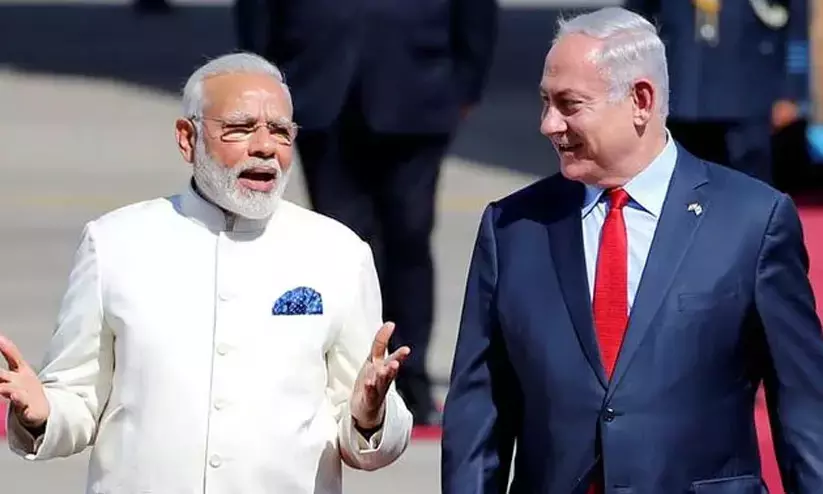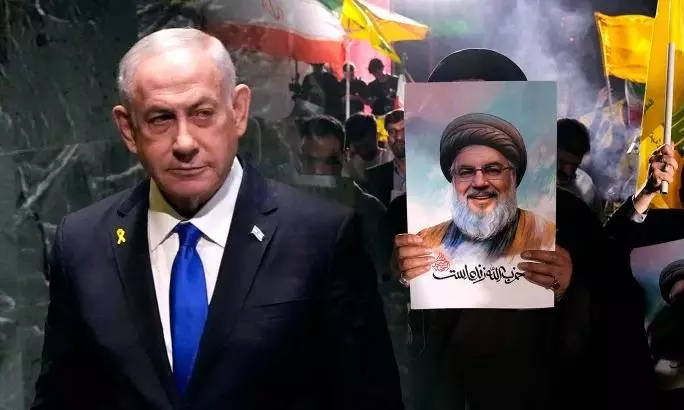
Israel intensifies attacks on Lebanon, Iran calls for more strikes, US rules out support
text_fieldsUS President Joe Biden announced that the United States would not support an Israeli attack on Iran’s nuclear sites amid escalating regional violence. Israeli strikes in central Beirut have killed six people, while clashes with Hezbollah have resulted in the deaths of eight Israeli soldiers, prompting Iran’s ‘axis of resistance’ to call for further attacks on Israel.
Heavy fighting in southern Lebanon has resulted in the deaths of eight Israeli soldiers and injuries to several others. The confrontations, which mark the most significant escalation since Israel began a ground incursion into Lebanon, highlight the growing regional conflict, as Iran-backed groups intensify their operations in support of Hezbollah.
The ongoing violence raises questions about the legality of Israel's actions under international law, with reports of indiscriminate strikes and civilian casualties further intensifying the debate around war crimes.
The largest group of soldiers killed were from Israel’s commando brigade, including an officer, who were engaged in combat in a village near Misgav Am, close to the Israeli-Lebanese border. Another two soldiers from the Golani brigade were killed in a separate confrontation. These casualties occurred against the backdrop of Israel’s ground offensive aimed at dismantling Hezbollah’s infrastructure in southern Lebanon, a move that has drawn widespread condemnation, especially after reports of significant civilian harm caused by Israeli airstrikes.
The area of southern Lebanon where the combat occurred has long been a flashpoint between Hezbollah and the Israel Defense Forces (IDF). The two sides have engaged in numerous skirmishes over the years, but this latest escalation appears to be one of the deadliest.
Hezbollah claims to have destroyed three Israeli Merkava tanks using guided rockets in Maroun el-Ras, further intensifying the hostilities. While Israel has yet to confirm these claims, the impact on both sides has been considerable, with the group asserting it inflicted significant damage on Israeli forces attempting to breach the border region.
In response to the growing number of casualties, Israel has intensified its military presence, deploying additional units to southern Lebanon. Ground forces from the 36th armoured division have joined the 98th division already operating in the area, reinforcing the IDF’s incursion efforts. However, these operations have resulted in significant collateral damage, particularly in densely populated areas.
Israeli airstrikes on a medical centre in central Beirut killed at least six people. The facility, operated by a Hezbollah-linked organisation, became the target of the second airstrike on the city’s centre this week. These strikes mark a departure from Israel’s previous tactics, which largely focused on Hezbollah strongholds in Beirut’s southern suburbs. The increasing use of force in civilian areas has provoked international condemnation, as many see these actions as indiscriminate attacks on non-combatants.
Beirut residents reported hearing missiles flying overhead before the medical centre was struck, with many residents fleeing the city, worried about further violence. The scenes of destruction bring to mind the 2006 war, where Israel’s campaign against Hezbollah led to widespread devastation across southern Lebanon.
In recent weeks, Israel’s military actions have drawn criticism for their lack of distinction between military targets and civilian infrastructure, a key criterion in determining whether acts of war violate international law. Under the Geneva Conventions, parties to a conflict are required to distinguish between combatants and civilians, and deliberate attacks on civilian infrastructure can be classified as war crimes.
Israel’s strikes on medical facilities, including the one in Beirut, and the use of overwhelming force in densely populated areas have led some to accuse the IDF of failing to adhere to these standards. The inability to verify the exact circumstances of these attacks has compounded concerns, particularly regarding the accuracy of Israeli claims that Hezbollah positions were the intended targets.
Hezbollah’s response has been equally aggressive, with the group claiming responsibility for several attacks on Israeli soldiers. The group has been engaged in continuous rocket fire into Israel since the latest escalation, though its operational capacity has been weakened due to Israeli airstrikes targeting its leadership.
The killing of Hezbollah leader Hassan Nasrallah in a recent Israeli operation has significantly impacted the group, which has lost hundreds of fighters in the ongoing conflict. Despite these losses, Hezbollah continues to resist Israeli advances, drawing support from other Iran-backed groups in the region.
The broader context of the conflict has also drawn in other regional actors. Iran, Hezbollah’s chief backer, launched over 180 missiles into Israel earlier this week, a move that has raised fears of a broader regional war. Iran’s actions came after a series of Israeli strikes targeted its allies in Lebanon and Gaza, including the assassination of several commanders. Armed groups across the region, including in Yemen, Syria, and Iraq, have publicly backed Hezbollah and Iran’s efforts, with some threatening to launch further attacks on Israel.
Internationally, pressure is mounting on Israel to moderate its response. US president Joe Biden has publicly stated that he does not support an Israeli attack on Iranian nuclear sites. While Washington has backed Israel’s right to defend itself, it has also urged caution in handling the broader regional dynamics, which have the potential to spiral into a full-scale war.























